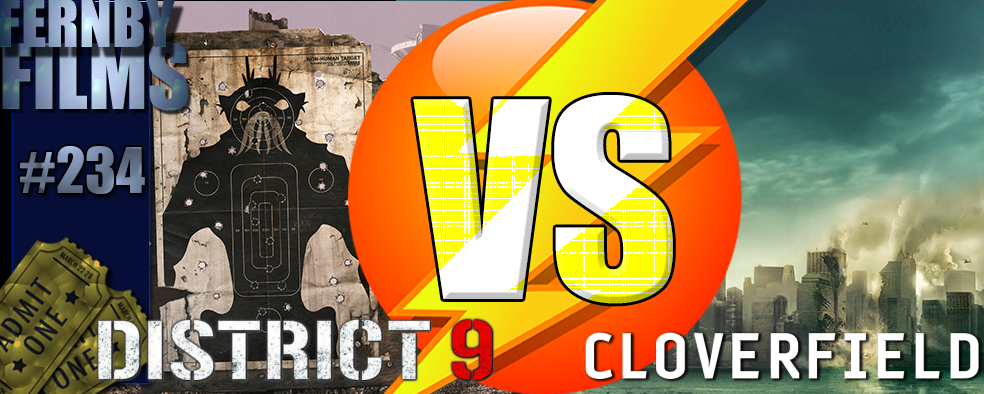Movie Review – Aliens Among Us: District 9 vs Cloverfield
It’s that time of year again: the American blockbuster summer season, and again, we are under attack. Yeah, okay, so Katherine Heigl has inflicted some cinemtaic travesty yet again, but instead of being attacked by simpering, romantic stupid-comedy, it’s the good old Hollywood staple: aliens. Thank God, because if I have to sit through another He’s Just Not That Into You or The Ugly Truth I might just have to invent my own giant green death ray and obliterate something important. Last time round, the big monster tore shreds out of the Big Apple, gave the viewing public a real scare, and brought back vivid memories of The Blair Witch Projects’ vomit-inducing cinematography. This time, the extraterrestrial interlopers have been given a suburb of Johannesburg to inhabit, with typically human racist attitudes again becoming the most prevalent problem they face, as well as our desire to develop their technology into weaponry so we can destroy each other more effectively. So which one of these two modern alien blockbusters would have the upper hand in pitched battle? Read on to find out more. Oh, and if you’re an alien, please discontinue reading now. This computer is being monitored.
Previously published over at moviesmackdown.com, this article pits two of the most recent blockbuster sci-fi outings to take audiences by surprise, Cloverfield and District 9. One produced by uber-producer JJ Abrams, and the other overseen by Peter Jackson, these films represent similar, yet different, views on Alien invasion. Enjoy.
It’s that time of year again: the American blockbuster summer season, and again, we are under attack. Yeah, okay, so Katherine Heigl has inflicted some cinematic travesty yet again, but instead of being attacked by simpering, romantic stupid-comedy, it’s the good old Hollywood staple: aliens. Thank God, because if I have to sit through another He’s Just Not That Into You or The Ugly Truth I might just have to invent my own giant green death ray and obliterate something important. Last time round, the big monster tore shreds out of the Big Apple, gave the viewing public a real scare, and brought back vivid memories of The Blair Witch Projects’ vomit-inducing cinematography. This time, the extraterrestrial interlopers have been given a suburb of Johannesburg to inhabit, with typically human racist attitudes again becoming the most prevalent problem they face, as well as our desire to develop their technology into weaponry so we can destroy each other more effectively. So which one of these two modern alien blockbusters would have the upper hand in pitched battle? Read on to find out more.
Oh, and if you’re an alien, please discontinue reading now. This computer is being monitored.
What would happen if an enormous spaceship filled with aliens needed our help? Like some sort of bizarre refugee/asylum scenario, we had to house them in our backyard? Once the euphoria of first contact has worn away, would we treat our intergalactic neighbors better than our fellow humans in similar situations? The answer is, probably not: it’s this story point that District 9 plays upon so well and hammers home to us the fact that, as a species, perhaps we really aren’t that great after all. Should we be truly surprised if one day some bunch of ET’s rock up and decide to go all Independence Day on us? District 9 is no Independence Day, however. As a film it is a singular tour de force of design, cinematography and filmmaking narrative that cannot help but draw the viewer in and punch them solidly in the face…. figuratively speaking, of course. But instead of the usual Hollywood cliche of having these aliens show up in New York or Washington, Los Angeles or London, they bring their spacecraft to hover over the most unlikely place: Johannesburg, South Africa. This in itself lends a sense of fresh perspective to the proceedings, as unfamiliar landmarks and landscapes make the most of the amazing effects on offer here. District 9 is tense, there’s no denying it. With the alienes being housed in a cordoned-off slum, the titular disctrict 9, violence and crime abound, and the government is forced by popular mandate to do something about it. We wont tolerate a bunch of unruly aliens living in our cities behaving like common thugs! A violent, gory, hard-core sci-fi epic with a message or two thrown in, District 9 lands solid punch after solid punch. But how will it stand up under the scrutiny of another, recent hand-held masterpiece in Cloverfield?
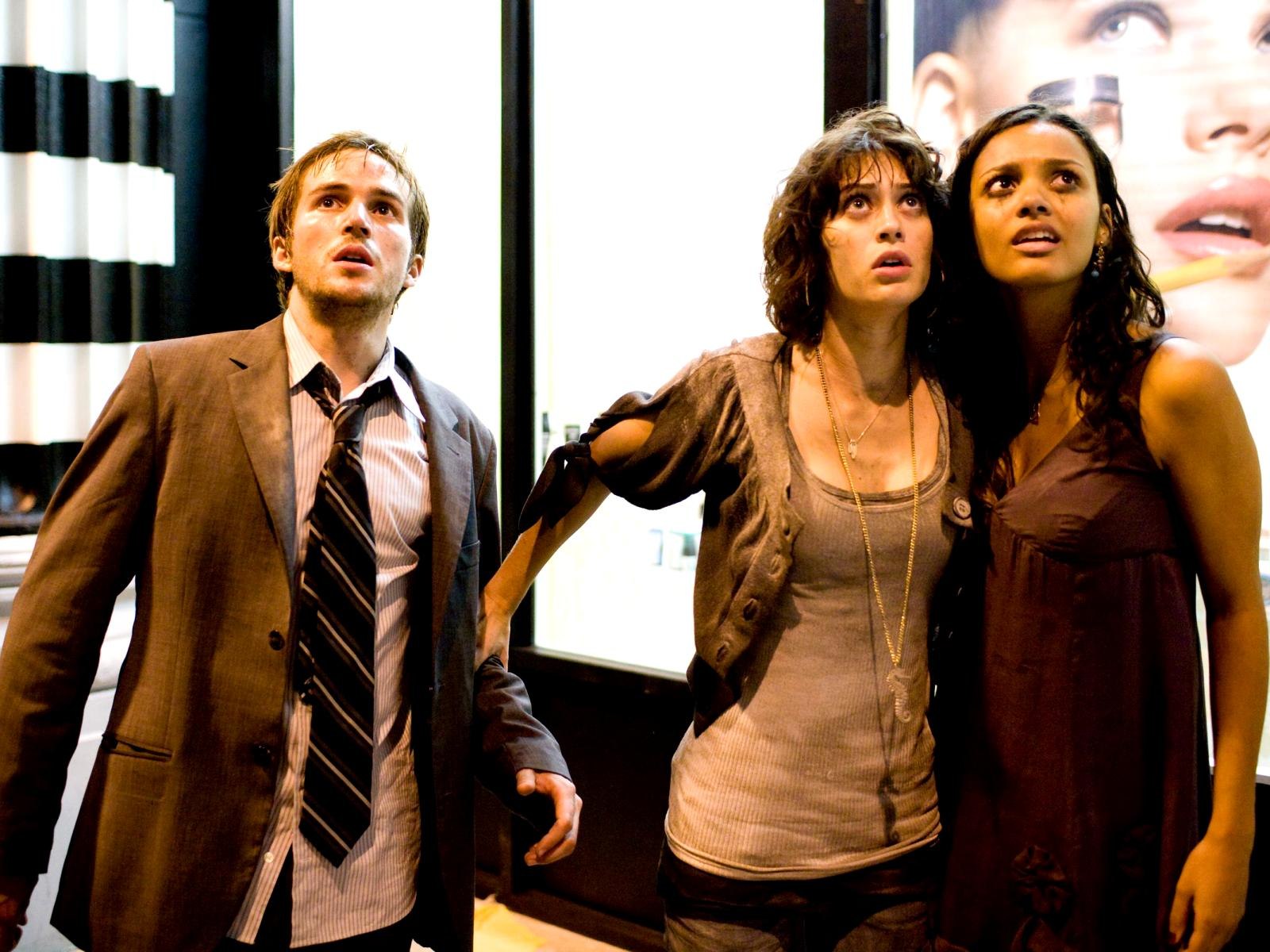
Bursting onto the cinematic landscape as a no-title trailer back in 2007, Cloverfield was a polarising force in the mainstream Hollywood oeuvre. Produced by wunderkind director/writer/creator/janitor JJ Abrams, himself responsible for Tom Cruise’s recent re-appraisal of the Mission: Impossible series, as well as the most recent Star Trek film, and directed by first-timer Matt Reeves, Cloverfield was a fly-on-the-wall revelation of what an alien attack on New York City might look like. It would appear from this disturbingly realistic, slightly voyeuristic film, that even in this post-9/11 age, there’s nothing that delight US audiences more than seeing their infrastructure and superstructure destroyed in cataclysmic fireballs of obliteration. Ghostly images of 9/11 reared up in Cloverfield, as an enormous alien entity wreaks havoc in Manhattan, bringing down buildings and shattering lives at every turn. The giant beast is also seemingly indestructible, the US military’s much-vaunted might about as useful as a deviated septum against the other-worldly being. We follow a group of friends, as they record their experiences trying to rescue an ex-girlfriend and escape the ravaged city on digital tape (the remnants of which form the basis for the film). Audiences, especially genre fans, applauded Reeves efforts in trying to bring another dimension, another slant on the tried and true alien invasion flick; it was a dark, melancholy, brutal affair that tore shreds from both the viewer and the cast. No wisecracking Will Smith or gung-ho Captain Kirk in this one: nope, Cloverfield fed upon the stuff of nightmares, and captured audience imagination in a way never seen before.
Okay, I’ll admit that the last film I watched that came from Africa was probably The Gods Must Be Crazy. Apart from that, and The Power Of One, there’s not a lot I know about the South African film scene. So it’s nice to see another South African film doing well in mainstream again!
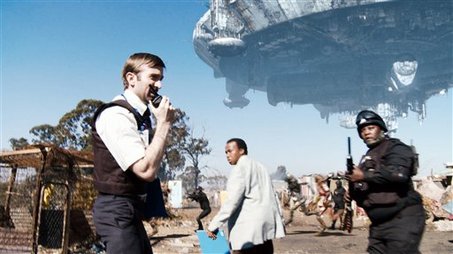
Truthfully, both these films are decidedly different in many ways, however, there are enough similarities to warrant closer inspection here today. Firstly, both films involve a fair degree of ye olde hand-held camerawork, which will either annoy you for it’s frenetic eye-blistering discombobulation, or allow you to be more fully drawn into the story. Cloverfield remains the more cinematically disinclined, in this regard, since it’s wobbly “amateur videographer” feel is a little more gregarious and a lot less refined than District 9’s, which manages to skirt amateur hour and remain quite steady. But this gritty, “realism” style of filmmaking has it’s place. But tricking an audience into believing that what they are seeing is “real” footage, only serves to make you more emotionally invested in the outcome for the characters on screen. Cloverfield’s teen-angst opening, with a party going rapidly south, is savage in it’s honesty of today’s youth, an indictment on the vapidity which our younger generation view the world. When the alien in Cloverfield attacks, all hell breaks loose, and our intrepid team of characters make the ludicrous decision to cross New York (which is rapidly becoming something akin to a demolition site) to save one of their friends, who may/may not be alive and trapped in her apartment. And so we follow them, camera shaking as they dodge military command posts and alien attack, subliminally allowing the story to progress with tidbits of information coming thick and fast in their encounters with others as they travel. Producer JJ Abrams has discovered the Holy Grail of filmmaking, in his preemptive strike on cinema-goers with Cloverfield; how to add the wow factor into the promotion of a film. I think most of us can remember seeing that first trailer for Cloverfield, which at the time was untitled, and going “What the? I have to know what that is!!” which, for a film studio, is exactly what they want to hear. And for the first part of Cloverfield, he makes you wait even longer to find out, because the enormous Alien isn’t fully revealed until practically the very end of the movie. It’s this Hitchcockian vibe that keeps audiences engaged in Cloverfield, coupled with the rapid-fire cinematography, revealing only bits and pieces as we go along. I think, had Cloverfield been shot as a regulation action sci-fi flick like many others, it’s impact would have been dramatically reduced. The actors aren’t strong enough to carry the raw emotions of this film, and as I sit here thinking about it, perhaps even Matt Reeves and Abrams struck out a little by playing on our 9/11 emotions. After all, using imagery and themes of buildings collapsing like the World Trade Center automatically put you into a certain emotional space. While I guess you’d consider this a canny way of achieving a certain emotional manipulation to make an audience feel a certain way, it’s a little bit hollow now that 9/11 is getting further and further into the past.
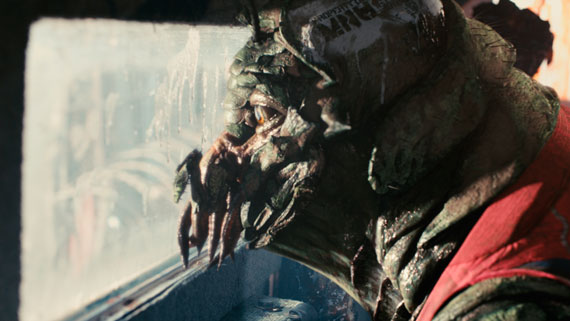
District 9, in a similar fashion, also plays upon a previous emotional trigger to get us into the right headspace for this film: guilt. After a few days of mulling this over, I get the feeling Neill Blomkamp has tried to make us, as a race of beings living on a rock hurtling through space, feel a little guilty. Our attitudes on life from being the superior species on this planet have given us a sense of self-important piousness, something that District 9 displays and tries to tear down with it’s gritty, grimy view of the world. We follow Wikus Van Der Merwe, an agent for multinational conglomerate MNU, which has been tasked by the South African government to relocate the aliens from their slum in district 9, to a new camp further outside Johannesburg. Even though the MNU spin doctors explain it as a step up, we, and the people actually on the ground for MNU know that it’s going to be a lot worse. There’s even an audio reference to Nazi concentration camps, perhaps another emotional trigger for a certain sense of guilt. Like Cloverfield, District 9 plays it real, as realisitcally as possible, and for that, the film works wonders.There’s a hard edge to both films, in this regard. For Cloverfield, it’s the impending inability of anybody to do anything about the giant alien tearing New York to shreds. In District 9, it’s the racial vilification and elitist attitude threatening to destroy and entire species due in part to our own fondness for self-destruction. Both films utilise some iconic imagery to get their point across: for Cloverfield‘s shaky-cam explosiveness allows us to voyueristically journey into a real catastrophic event, and we get front row seats to the insane madness that must be a battle of survival. District 9 brings us into the hotbed of violence and retribution for decades of persecution of the stranded alien race now living in Africa, and the fight for their survival by not only the aliens themselves, but by one of us. There’s elements of apartheid and caste systems in place here that mirror some of our own, indelibly mindless history.
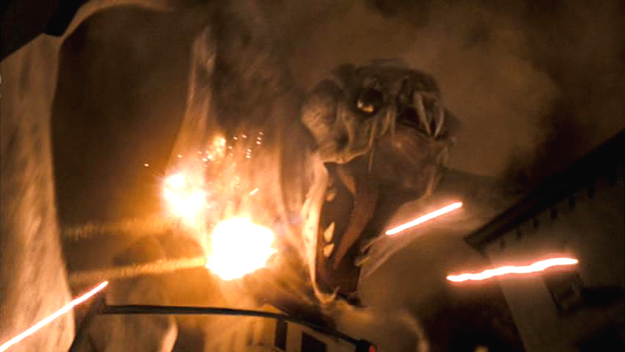
Of course, you can’t go past a good sci-fi film without talking a little about the effects. Most effects in film these days, especially the big budget ones, are pretty decent, given the money thrown about. Cloverfield‘s effects are large scale, told intimately through the single unwavering eye of a badly held video camera. Alien carnage and destruction, the explosive demise of New York City, the sheer scale of the creature itself, all brilliantly executed. If you compare the effects in Cloverfield with, say, the 97′ remake of Godzilla, you’ll soon see just how far we’ve come in effects work. Godzillas rampage through NYC was, at that stage, a cool way of seeing just how a creature that size may interact with all that infrastructure. But it was flawed by some illogical science and physics, as well as an ever changing idea on just how big the giant lizard actually was. Cloverfields monster isn’t as tame as Godzilla, and it literally just doesn’t stop. Indestructible, vicious, brutal: Cloverfield delivers one of the more frightening movie monsters of recent times.
District 9 is a little more judicious with it’s use of effects. Director Blomkamp is a tech geek from way back, apparently, so he should know how to utilise digital creations within the film medium: he does, and it’s awesome. The great tact used in District 9 is that the creatures, the digital aliens, are in the film from the start, there’s no big “reveal” shot that so many Hollywood films seem intent to use. They just exist, and after the first few moments, you never really see them as anything other than characters in the film. It’s seamless, a blend of Gollum’s magic mixed with hard-core realism. There are no strings here, no wires behind the scenes holding up the effects: the aliens beldn so well into the film that you start to find yourself sitting there wondering just how on earth they blended them all in so perfectly! And to imagine, this was accomplished with about a tenth the budget of this years other monster effects film, Transformers 2! It’s an astonishing technical feat, and is worthy of the price of admission alone. So to get this level of effects, as well as a story of this quality, makes this a special film indeed.
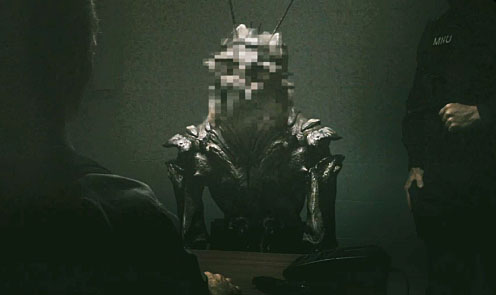
Where do both films fit within the science fiction category they both so profoundly enter into? Cloverfield has the more “thrill ride” mentality going for it, it’s a brainless popcorn thriller, special effects blockbuster of a nature unlike the Armageddons and the Transformers of the world. The characters within Cloverfield are simple, cardboard cutouts, cliches of young hothead folks clinging to the belief that somehow, no matter how bad it gets, the Government will eventually solve all their problems. District 9, on the other hand, has characters who are the problem, and it’s the gradual realisation by those people that they actually have a problem to begin with that forms one of the many story arcs in the film. Like the similarly toned Children of Men, which told of the dystopian future where children have ceased to be born, District 9 never shies away from the hard edge of truth: would we behave like this if this scenario really occurred? Would we treat these visitors, these guests to our planet, with the disdain and arrogant superiority that we often treat those less fortunate? The answer, unfortunately, is probably yes.
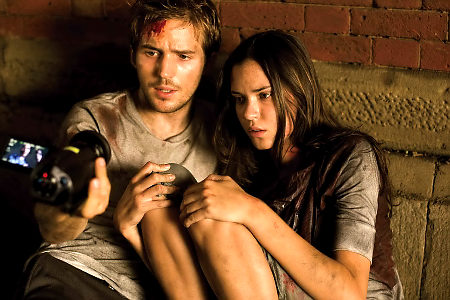
Depending on your penchant for science fiction, or more importantly, a sci-fi ethos grounded in realism, you’ll either love or hate both these films in equal measure. Cloverfields eye-wateringly jarring camera style will put off even more people, especially those Blair Witch haters who threw up in the cinema. District 9, while still having it’s fair share of shaky camera action, doesn’t continue it ad-nausea, and while still remaining hand-held for the duration, is stable enough for even the most weak-stomached among us to enjoy. But where the films are truly disparate is their essential narrative: Cloverfield is simply the search for a missing friend, dodging alien attack and military hardware. District 9 endeavours to broaden our understanding of ourselves, perhaps by indicting us as a species for being selfish, ruthless bottom-feeders who put our own interests before the common good. In this way, District 9 has the advantage over Cloverfield, and is an ultimately more intellectually stimulating cinema experience.

